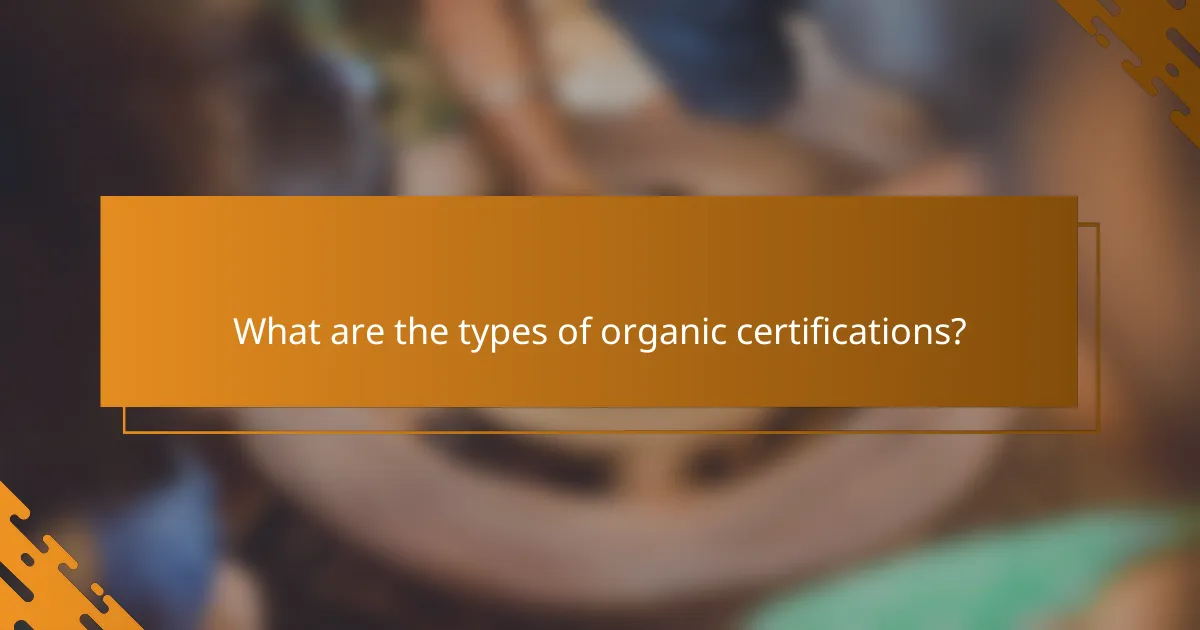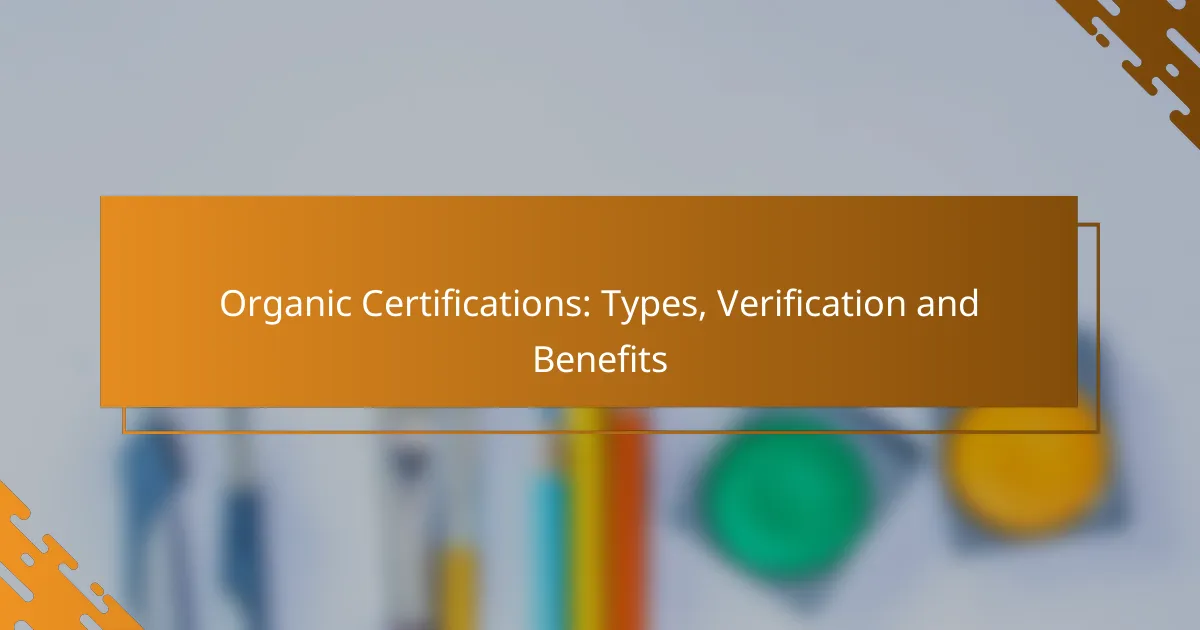Organic certifications play a crucial role in ensuring that agricultural products meet established standards for organic farming, free from synthetic chemicals and genetically modified organisms. The verification process involves thorough inspections and compliance with regulations set by certifying bodies, guaranteeing the integrity of organic claims. By promoting health, environmental sustainability, and market access, these certifications foster consumer trust and support a more responsible agricultural system.

What are the types of organic certifications?
Organic certifications vary by region and ensure that products meet specific agricultural standards. These certifications help consumers identify products that are grown and processed without synthetic fertilizers, pesticides, or genetically modified organisms.
USDA Organic Certification
The USDA Organic Certification is a widely recognized standard in the United States, ensuring that products are at least 95% organic. To obtain this certification, farmers must follow strict guidelines, including using organic seeds and maintaining detailed records of their farming practices.
Producers can label their products as “100% Organic” if they meet the highest standards. It’s essential for consumers to look for the USDA seal on packaging to confirm authenticity.
EU Organic Certification
The EU Organic Certification is governed by the European Union’s regulations, which require that at least 95% of the ingredients in a product be organic. This certification focuses on sustainable farming practices and prohibits the use of synthetic pesticides and fertilizers.
Products that meet these standards can display the EU organic logo, which helps consumers easily identify organic goods across member countries. Compliance is monitored through regular inspections by accredited certifying bodies.
Canadian Organic Certification
In Canada, the Organic Products Regulations set the framework for organic certification, requiring compliance with national standards. To be certified, products must be grown without prohibited substances for at least three years prior to harvest.
Canadian organic products can bear the Canada Organic logo, which signifies adherence to these regulations. Farmers must maintain detailed records and undergo annual inspections to retain certification.
Japan Organic Certification
Japan’s organic certification system is regulated by the Japanese Agricultural Standards (JAS). To be certified, products must meet specific criteria, including the prohibition of synthetic chemicals and genetically modified organisms.
JAS certification is recognized domestically and internationally, allowing Japanese organic products to compete in global markets. Producers must undergo thorough inspections and maintain compliance with JAS guidelines.
Other International Certifications
Several other countries have their own organic certification systems, such as Australia’s National Organic Standard and India’s National Programme for Organic Production. Each system has unique requirements but generally emphasizes sustainable practices and the absence of synthetic inputs.
For international trade, products may also seek certifications like the Global Organic Textile Standard (GOTS) for textiles or the International Federation of Organic Agriculture Movements (IFOAM) accreditation. These certifications help ensure that organic products meet global standards, enhancing consumer trust.

How is organic certification verified?
Organic certification is verified through a systematic process that includes inspections, documentation, and adherence to compliance standards. This ensures that producers and processors meet specific organic regulations set by certifying bodies.
Inspection Process
The inspection process involves a thorough evaluation of the farm or facility by a certified inspector. This typically occurs annually and includes observing practices, reviewing records, and taking samples if necessary. Inspectors look for compliance with organic standards, such as soil health, pest management, and use of organic inputs.
During the inspection, producers should be prepared to demonstrate their organic practices and provide access to all areas of the operation. Common pitfalls include inadequate record-keeping or failure to address previous non-compliance issues, which can jeopardize certification.
Documentation Requirements
Documentation is crucial for organic certification verification. Producers must maintain detailed records of their farming practices, inputs used, and sales. This includes invoices, receipts, and logs that trace the organic products from farm to market.
It’s advisable to organize documentation in a systematic manner, such as using spreadsheets or dedicated software. This not only simplifies the inspection process but also helps in tracking compliance over time. Missing or incomplete documentation can lead to delays or denial of certification.
Compliance Standards
Compliance standards for organic certification vary by country but generally align with established guidelines, such as those from the USDA in the United States or the EU Organic Regulation in Europe. These standards dictate what practices and substances are permissible in organic farming.
Producers should familiarize themselves with the specific regulations applicable to their region, as non-compliance can result in penalties or loss of certification. Regular training and updates on organic standards can help maintain compliance and ensure ongoing certification success.

What are the benefits of organic certifications?
Organic certifications provide numerous advantages, including improved health outcomes, environmental protection, and enhanced market access for producers. These benefits contribute to a more sustainable agricultural system and can lead to increased consumer trust and demand.
Health Benefits
Organic certifications often indicate that products are grown without synthetic pesticides, herbicides, or fertilizers, which can lead to healthier food options. Consumers may experience reduced exposure to harmful chemicals, potentially lowering health risks associated with conventional farming practices.
Additionally, organic farming practices typically promote biodiversity, which can enhance the nutritional quality of food. Studies suggest that organic produce may contain higher levels of certain vitamins and antioxidants, benefiting overall health.
Environmental Benefits
Organic certifications support sustainable farming practices that prioritize soil health, water conservation, and reduced pollution. By avoiding synthetic chemicals, organic farming helps maintain ecosystem balance and reduces the risk of contaminating local waterways.
Moreover, organic practices often encourage crop rotation and biodiversity, which can enhance soil fertility and reduce erosion. This commitment to environmental stewardship contributes to long-term agricultural sustainability and resilience against climate change.
Market Access
Obtaining organic certification can open doors to new markets, as consumers increasingly seek organic products. Retailers and restaurants often prefer to stock organic items, allowing certified producers to reach a broader audience and potentially command higher prices.
In many regions, organic certification is a requirement for selling products in specialty markets or health food stores. Understanding local regulations and certification processes is crucial for producers looking to capitalize on the growing demand for organic goods.

What are the prerequisites for obtaining organic certification?
To obtain organic certification, farms must adhere to specific standards that ensure sustainable practices. Key prerequisites include implementing organic soil management, pest management strategies, and maintaining thorough records of all agricultural activities.
Soil Management Practices
Effective soil management is crucial for organic certification. Farmers must utilize practices that enhance soil fertility and structure, such as crop rotation, cover cropping, and the application of organic fertilizers like compost or manure. These methods not only improve soil health but also promote biodiversity.
It is essential to avoid synthetic fertilizers and pesticides, as their use can disqualify a farm from organic status. Regular soil testing can help monitor nutrient levels and pH, guiding farmers in making informed decisions about soil amendments.
Pest Management Strategies
Organic pest management focuses on prevention and control without synthetic chemicals. Techniques include introducing beneficial insects, using traps, and applying organic-approved pesticides when necessary. Integrated Pest Management (IPM) is often recommended, combining various methods for effective pest control.
Farmers should regularly monitor pest populations and environmental conditions to anticipate outbreaks. Keeping a diverse ecosystem can also help in naturally managing pests, reducing reliance on chemical interventions.
Record Keeping
Maintaining detailed records is a vital component of organic certification. Farmers must document all inputs, including seeds, fertilizers, and pest control measures, as well as the dates and methods of application. This transparency helps verify compliance with organic standards.
Records should also include sales and production data to demonstrate the farm’s organic practices over time. Regular audits may require these documents, so it is beneficial to establish a systematic approach to record keeping from the outset.

How do organic certifications impact e-commerce?
Organic certifications significantly influence e-commerce by enhancing consumer confidence and allowing businesses to stand out in a competitive market. These certifications ensure that products meet specific organic standards, which can lead to increased sales and customer loyalty.
Consumer Trust
Organic certifications play a crucial role in building consumer trust. When shoppers see a certified organic label, they often feel more secure about the quality and safety of the product. This trust can translate into repeat purchases and positive word-of-mouth recommendations.
To leverage this trust, e-commerce businesses should prominently display their organic certifications on product pages. Clear communication about the certification process and standards can further reassure customers about their purchasing decisions.
Product Differentiation
In a crowded e-commerce landscape, organic certifications help products stand out. They provide a clear distinction between organic and non-organic items, allowing consumers to make informed choices based on their values and preferences. This differentiation can be particularly effective in categories like food, beauty, and personal care.
Businesses can enhance product differentiation by highlighting unique aspects of their organic offerings, such as sourcing practices or local farming partnerships. This not only attracts organic-minded consumers but also positions the brand as a leader in sustainability.
Pricing Strategies
Organic certifications often allow businesses to adopt premium pricing strategies. Consumers are generally willing to pay more for certified organic products due to perceived health benefits and environmental considerations. This can lead to higher profit margins compared to non-organic alternatives.
However, it’s essential to balance pricing with market expectations. Conducting market research to understand competitive pricing for similar organic products can help set appropriate price points. Additionally, offering promotions or discounts on organic items can attract new customers while maintaining perceived value.



